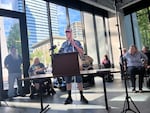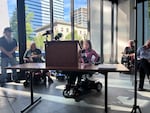
Tents line the entirety of some city blocks in Portland's Old Town on March 23, 2022.
Julie Sabatier / OPB
A group of Portlanders with disabilities is suing the city for failing to keep public sidewalks accessible.
The issue isn’t curb cuts or sidewalk width. The problem, the lawsuit alleges, is tents on the sidewalk, which prevent people with wheelchairs and walkers from passing without difficulty.
The class action lawsuit filed Tuesday in federal court accuses the city of violating the Americans with Disabilities Act by allowing people to camp on city sidewalks. The Americans with Disabilities Act, known as the ADA, bars discrimination based on disability and requires sidewalks be accessible to everyone.
Right now, the lawsuit states, Portland sidewalks are only available to those who have the ability to sidestep the camps. The suit names 10 plaintiffs, most of whom use a wheelchair, cane or walkers and say they have to go out of their way to navigate around tents.
In a press conference held in the Wells Fargo Exchange Block steps from City Hall, a handful of plaintiffs spoke about the difficulties they’ve had navigating Portland streets in the last few years as tents have proliferated across the city. Steve Jackson, a 47-year-old man who is blind, said he often accidentally steps on people. Barbara Jacobsen, a 62-year-old who uses an electric wheelchair, says she often has to go into the street with traffic to avoid the tents.
“The city has abandoned us and the homeless,” said Jacobsen.
A city spokesperson declined to comment on the lawsuit. The city does not usually comment on ongoing litigation.
Details of the case
Plaintiffs want a judge to order the city to clear sidewalks of tents and provide emergency shelters for everyone displaced as a result. The lawsuit also asks a judge to include all Portlanders with mobility disabilities and their caretakers as plaintiffs.
John DiLorenzo, an attorney with the law firm Davis Wright Tremaine and lead counsel in the suit, is a perennial thorn in the side of city leaders and their lawyers. He has sued Portland multiple times over the years in pursuit of policy changes, often successfully. In 2017, he won a $10 million settlement against the city in a lawsuit alleging the Portland Water Bureau had misused ratepayer dollars.

Steve Jackson, a 47-year-old man who is blind, speaks at a press conference Wednesday on the class action. Jackson said he often accidentally steps trips over people moving around the city.
Rebecca Ellis / OPB
It’s unclear what DiLorenzo’s chance of success is this time. He said there have been a handful of similar lawsuits in recent years alleging people with disabilities have had their rights violated due to homeless camps — including one against the city of San Francisco related to homeless individuals in the Tenderloin neighborhood and one in Los Angeles. The San Francisco suit was settled. The Los Angeles case is still being litigated, he said.
DiLorenzo often represents the region’s powerful business interests, a faction that has grown increasingly fed up with public camping. This year, a nonprofit called People for Portland, funded in large part by wealthy developers, made a doomed effort to get a measure on the November ballot that would eliminate outdoor camping and force the city to build emergency shelters.
Vadim Mozyrsky, a former Portland City Council candidate and administrative law judge who specializes in disability law, helped initiate the latest lawsuit over sidewalk camping. He objected to the notion that this was just the business community’s latest attempt to move the city’s homeless population out of downtown.
“Look behind you, are these business interests?” Mozyrsky, flanked by several plaintiffs in wheelchairs, said at the press conference. “These are individuals that speak on behalf of thousands of other individuals.”

Lorien Welchoff, a 21-year-old student who uses an electric wheel chair, is one of the plaintiffs suing the city for failing to keep public sidewalks accessible. The class action lawsuit asks a judge to order the city clear sidewalks of tents and provide emergency shelters for everyone displaced.
Rebecca Ellis / OPB
No one Wednesday spoke for the thousands of Multnomah County residents who both have disabilities and are homeless.
A 2019 count of the county’s homeless population found that more than half of the people living outdoors or in shelters had a physical or mental disability. Both homeless and disability advocates say this lawsuit will do little to help this population and dismissed the suit as misguided.
“If we really care about people with disabilities, this doesn’t seem to be the answer,” said Katie O’Brien, the executive director of women’s shelter Rose Haven. “It’s a distraction that really kind of misses the broader need of our disabled community at large.”
Before landing with Davis Wright Tremaine, Mozyrsky said he approached Disability Rights Oregon, which frequently fights legal battles on behalf of Oregonians with disabilities. He said he was rebuffed.
Asked about the decision not to take on the lawsuit, Disability Rights Oregon executive director Jake Cornett said in a statement that the litigation wrongly pitted “some people with disabilities against other people with disabilities.”
“The City’s issue isn’t exclusive just to encampments — our sidewalks are littered with e-scooters, restaurant signs, and seating that narrow and obstruct the public right of way,” he wrote. “The City must do better in fulfilling its obligations to all people with disabilities.”
That includes people like Mo Teddy, who said he has been homeless for 25 years and uses a walker. Teddy, who OPB spoke with in downtown’s South Park Blocks, said he was hit by a car four years ago and broke both his legs and his arm.
Teddy said tents on the sidewalk sometimes make walking downtown difficult. But he said he’s just as frustrated by the city’s frequent homeless sweeps, which require him to relocate all of his belongings.
“Everywhere you go, you’re going to be pushed around,” he said.
